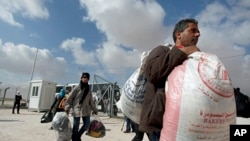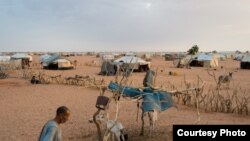GENEVA —
The United Nations refugee agency (UNHCR) is expressing alarm at the rising number of Syrian refugees it says are returning home from Jordan.
U.N. High Commissioner for Refugees spokesperson Melissa Fleming said Friday that since the beginning of April, around 3,000 refugees have crossed back into the Syrian province of Daraa from nearby Jordan.
Fleming said much of that area remains a battleground, and the agency fears for the safety of those returning.
Jordan: 421,547
Lebanon: 414,781
Turkey: 293,761
Iraq: 128,845
Egypt: 50,054
Source: UNHCR
“We are concerned that nothing is safe in Syria right now," she said. "We are also concerned because in these areas there are extreme shortages of food. There is lack of fuel, electricity and other services. And, there are, of course, reports of artillery shells and mortars being fired into the villages that refugees are trying to reclaim.”
The U.N. says, however, that new arrivals to Jordan continue to outpace those going back to Syria. An average of 2,000 people are crossing daily into Jordan, which is struggling to deal with the massive influx, the U.N. says.
Returnees face despair
But those electing to return from Jordan are joining hundreds of thousands in southern Syria who are short of basic staples like bread, a lack proper health care and access to education.
The reasons the refugees give for returning home are varied, Fleming said.
“They are hearing reports that there is improved security in their villages," she said. "They are really interested, of course, in safeguarding their property. There are family members they say they want to reunite with, and sometimes they travel actually to collect family members and bring them back into Jordan."
Some 3,900 Syrian refugees in Iraq have returned mainly from Al Qaim camp in Anbar Province to Abu Kamal in Syria over the past year, Fleming said. And she added that more than 97,000 Syrians have returned from Turkey since March 2011.
Influx continues
Still, neighboring countries, including Lebanon, are reaching their capacity in handling the influx of refugees fleeing the civil war in Syria.
Soner Cagaptay, director of the Turkish Research Program at the Washington Institute for Near East Policy, told VOA that Lebanon has already taken in 400,000 refugees, a great burden for a country of 4 million people.
"No country can handle this kind of an influx," he said. "I think Lebanon is at the brim of saying 'This is enough.'"
Earlier this week the UNHCR said the flow of aid to refugees in neighboring countries is falling short because it has only received $300 million of the $1 billion needed to handle the influx.
The agency said that Jordan, Turkey, Lebanon and Iraq have taken in a combined total of 1.3 million Syrian refugees.
Fighting continued in several parts of the war-torn country on Friday.
The Britain-based Syrian Observatory for Human Rights said that military forces clashed with opposition rebels in Damascus, killing at least one civilian and injuring several others.
It said troops also carried out airstrikes in central Homs province, Daraa province in the south and in the northern city of Aleppo.
U.N. High Commissioner for Refugees spokesperson Melissa Fleming said Friday that since the beginning of April, around 3,000 refugees have crossed back into the Syrian province of Daraa from nearby Jordan.
Fleming said much of that area remains a battleground, and the agency fears for the safety of those returning.
Syrian Refugees by Country
Syrian Refugees by CountryJordan: 421,547
Lebanon: 414,781
Turkey: 293,761
Iraq: 128,845
Egypt: 50,054
Source: UNHCR
The U.N. says, however, that new arrivals to Jordan continue to outpace those going back to Syria. An average of 2,000 people are crossing daily into Jordan, which is struggling to deal with the massive influx, the U.N. says.
Returnees face despair
But those electing to return from Jordan are joining hundreds of thousands in southern Syria who are short of basic staples like bread, a lack proper health care and access to education.
The reasons the refugees give for returning home are varied, Fleming said.
“They are hearing reports that there is improved security in their villages," she said. "They are really interested, of course, in safeguarding their property. There are family members they say they want to reunite with, and sometimes they travel actually to collect family members and bring them back into Jordan."
Some 3,900 Syrian refugees in Iraq have returned mainly from Al Qaim camp in Anbar Province to Abu Kamal in Syria over the past year, Fleming said. And she added that more than 97,000 Syrians have returned from Turkey since March 2011.
Influx continues
Still, neighboring countries, including Lebanon, are reaching their capacity in handling the influx of refugees fleeing the civil war in Syria.
Soner Cagaptay, director of the Turkish Research Program at the Washington Institute for Near East Policy, told VOA that Lebanon has already taken in 400,000 refugees, a great burden for a country of 4 million people.
"No country can handle this kind of an influx," he said. "I think Lebanon is at the brim of saying 'This is enough.'"
Earlier this week the UNHCR said the flow of aid to refugees in neighboring countries is falling short because it has only received $300 million of the $1 billion needed to handle the influx.
The agency said that Jordan, Turkey, Lebanon and Iraq have taken in a combined total of 1.3 million Syrian refugees.
Fighting continued in several parts of the war-torn country on Friday.
The Britain-based Syrian Observatory for Human Rights said that military forces clashed with opposition rebels in Damascus, killing at least one civilian and injuring several others.
It said troops also carried out airstrikes in central Homs province, Daraa province in the south and in the northern city of Aleppo.





